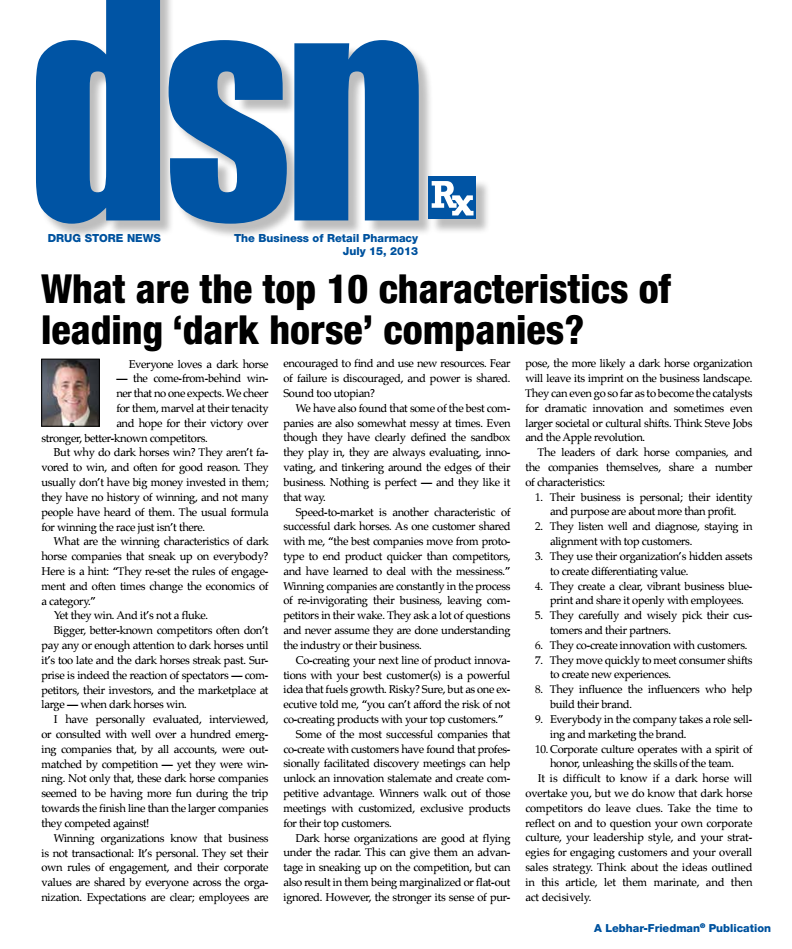Everyone loves a dark horse — the come-from-behind winner that no one expects. We cheer for them, marvel at their tenacity and hope for their victory over
stronger, better-known competitors.
But why do dark horses win? They aren’t favored to win, and often for good reason. They usually don’t have big money invested in them; they have no history of winning, and not many people have heard of them. The usual formula for winning the race just isn’t there.
What are the winning characteristics of dark horse companies that sneak up on everybody? Here is a hint: “They re-set the rules of engagement and often times change the economics of a category.”
Yet they win. And it’s not a fluke.
Bigger, better-known competitors often don’t pay any or enough attention to dark horses until it’s too late and the dark horses streak past. Surprise is indeed the reaction of spectators — competitors, their investors, and the marketplace at large — when dark horses win.
I have personally evaluated, interviewed, or consulted with well over a hundred emerging companies that, by all accounts, were outmatched by competition — yet they were winning. Not only that, these dark horse companies seemed to be having more fun during the trip towards the finish line than the larger companies they competed against!
Winning organizations know that business is not transactional: It’s personal. They set their own rules of engagement, and their corporate values are shared by everyone across the organization. Expectations are clear; employees are encouraged to find and use new resources. Fear of failure is discouraged, and power is shared.
Sound too utopian?
We have also found that some of the best companies are also somewhat messy at times. Even though they have clearly defined the sandbox they play in, they are always evaluating, innovating, and tinkering around the edges of their business. Nothing is perfect — and they like it that way.
Speed-to-market is another characteristic of successful dark horses. As one customer shared with me, “the best companies move from prototype to end product quicker than competitors, and have learned to deal with the messiness.” Winning companies are constantly in the process of re-invigorating their business, leaving competitors in their wake. They ask a lot of questions and never assume they are done understanding the industry or their business.
Co-creating your next line of product innovations with your best customer(s) is a powerful idea that fuels growth. Risky? Sure, but as one executive told me, “you can’t afford the risk of not co-creating products with your top customers.”
Some of the most successful companies that co-create with customers have found that professionally facilitated discovery meetings can help unlock an innovation stalemate and create competitive advantage. Winners walk out of those meetings with customized, exclusive products for their top customers.
Dark horse organizations are good at flying under the radar. This can give them an advantage in sneaking up on the competition, but can also result in them being marginalized or flat-out ignored. However, the stronger its sense of purpose, the more likely a dark horse organization will leave its imprint on the business landscape. They can even go so far as to become the catalysts for dramatic innovation and sometimes even larger societal or cultural shifts. Think Steve Jobs and the Apple revolution.
The leaders of dark horse companies, and the companies themselves, share a number of characteristics:
1. Their business is personal; their identity and purpose are about more than profit.
2. They listen well and diagnose, staying in alignment with top customers.
3. They use their organization’s hidden assets to create differentiating value.
4. They create a clear, vibrant business blueprint and share it openly with employees.
5. They carefully and wisely pick their customers and their partners.
6. They co-create innovation with customers.
7. They move quickly to meet consumer shifts to create new experiences.
8. They influence the influencers who help build their brand.
9. Everybody in the company takes a role selling and marketing the brand.
10. Corporate culture operates with a spirit of honor, unleashing the skills of the team.
It is difficult to know if a dark horse will overtake you, but we do know that dark horse competitors do leave clues. Take the time to reflect on and to question your own corporate culture, your leadership style, and your strategies for engaging customers and your overall sales strategy. Think about the ideas outlined in this article, let them marinate, and then act decisively.
A Lebhar-Friedman® Publication


